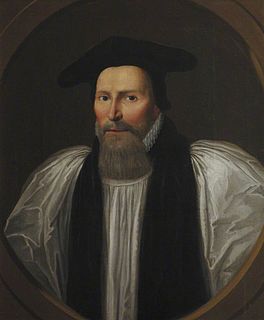This article needs additional citations for verification .(March 2022) |
John Rawlinson (1576 – 1631) was an English churchman and academic who was Principal of St Edmund Hall, Oxford from 1610.
This article needs additional citations for verification .(March 2022) |
John Rawlinson (1576 – 1631) was an English churchman and academic who was Principal of St Edmund Hall, Oxford from 1610.
He was son of Robert Rawlinson, merchant tailor of London, and was admitted to Merchant Taylors' School in 1585. He was elected scholar of St John's College, Oxford, in 1591, and graduated B.A. 5 July 1595, and M.A. 21 May 1599. He was acting as a college lecturer by 1599, and is stated to have been master of Reading School in 1600. He was elected a fellow of his college in 1602, taking holy orders and proceeding B.D. 12 November 1605, and D.D. 1 June 1608. He gained a reputation as a preacher.
From 1606 to 1610 he was rector of Taplow, Buckinghamshire; and from 1609 was vicar of Asheldam in Essex. On 1 May 1610 the provost and fellows of The Queen's College, Oxford elected him principal of St. Edmund Hall. He was also made chaplain to Lord Ellesmere, the lord chancellor, and chaplain-in-ordinary to James I, and was instituted to the prebend of Netherbury in Ecclesia at Salisbury, in which at his death he was succeeded by Thomas Fuller.
In 1613 he was inducted to the rectory of Selsey, Sussex, and in the following year to that of Whitchurch, Shropshire. He spent much time in Oxford, where in 1627 he built a new house, and was in confidential relations with William Juxon and William Laud.
He died on 3 February 1631, and was buried on the 10th in the church at Whitchurch.
Rawlinson published numerous separate sermons and one collected volume, entitled 'Quadriga Salutis, foure Quadrigesmal or Lent Sermons preached at Whitehall,’ Oxford, 1625, dedicated to the prince (Charles). He contributed verses to William Vaughan's Golden Grove moralised, 1600.

Richard Neile was an English churchman, bishop successively of six English dioceses, more than any other man, including the Archdiocese of York from 1631 until his death. He was involved in the last burning at the stake for heresy in England, that of the Arian Edward Wightman in 1612.

Samuel Harsnett, born Samuel Halsnoth, was an English writer on religion and Archbishop of York from 1629.
Richard Senhouse was an English churchman, Bishop of Carlisle from 1624 to 1626.

Thomas Goodwin, known as "the Elder", was an English Puritan theologian and preacher, and an important leader of religious Independents. He served as chaplain to Oliver Cromwell, and was imposed by Parliament as President of Magdalen College, Oxford, in 1650. Christopher Hill places Goodwin in the "main stream of Puritan thought".

John Buckeridge was an English churchman.
John Aglionby was an English clergyman and academic who was one of the translators of the King James Version of the Bible.

Edward Reynolds was a bishop of Norwich in the Church of England and an author. He was born in Holyrood parish in Southampton, the son of Augustine (Austin) Reynolds, one of the customers of the city, and his wife, Bridget.
Robert Skinner was an English bishop successively of Bristol, of Oxford, and of Worcester.
Robert Harris (1581–1658) was an English clergyman, known as a Puritan preacher, member of the Westminster Assembly, and President of Trinity College, Oxford.

Christopher Potter was an English academic and clergyman, Provost of The Queen's College, Oxford, controversialist and prominent supporter of William Laud.
Thomas Westfield was an English churchman, Bishop of Bristol and member of the Westminster Assembly.

John Kettlewell was an English clergyman, nonjuror and devotional writer. He is now known for his arguments against William Sherlock, who had justified the change of monarch of 1688–89 and his own switch of sides in The Case of the Allegiance. According to J. P. Kenyon, Kettlewell's reply made a case "with which conformist Anglicans could only agree, because it was spiritual, while Sherlock's was resolutely aspiritual". He went on to attack defenders of the Glorious Revolution generally as proponents of fallacious contractarian theories.
John Pocklington was an English Laudian clergyman and polemicist. By order of the Long Parliament, two of his works were burned in public.
Thomas Playfere was an English churchman and theologian, Lady Margaret's Professor of Divinity at Cambridge from 1596.
John Randall (1570–1622), was an English puritan divine.
Henry Felton D.D. (1679–1740) was an English clergyman and academic.
Samuel Page (1574–1630) was an English clergyman and poet.
Edmund Bateman (1704–1751) was an English cleric and academic, the Archdeacon of Lewes from 1737 until 1751.
Edward Gee (1565–1618) was an English cleric, academic, and fellow of Chelsea College.
George Wilde was Bishop of Derry from 1661 to 1665.